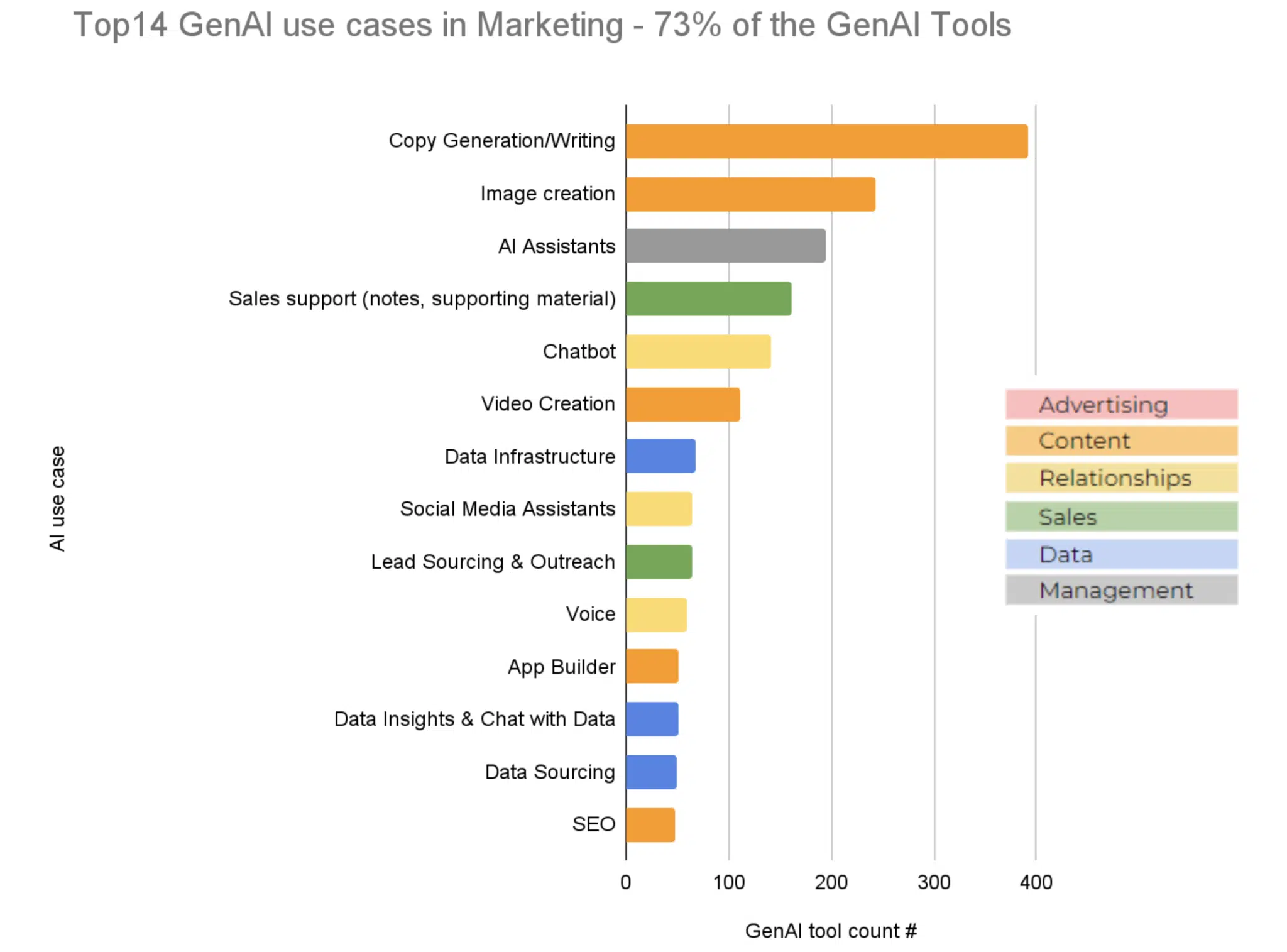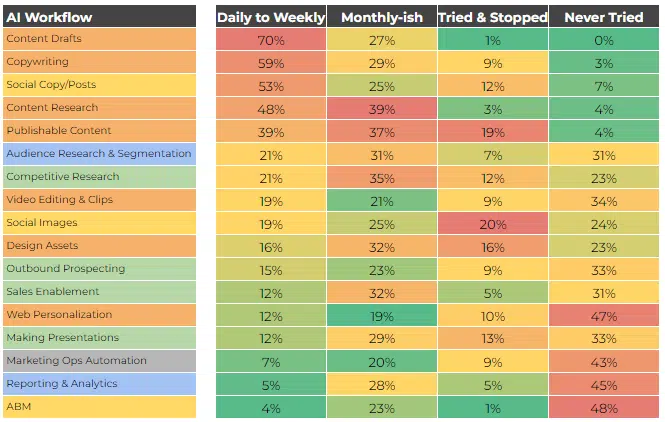Unlock the real value of genAI in martech
Learn which generative AI solutions deliver tangible martech results — boosting efficiency and scaling operations effectively.
Eighteen months after GPT-4 shook the martech world, the dust is settling and it’s time to evaluate the real-world impact of generative AI. As brands and vendors navigate integrating genAI into their marketing stacks, one key question emerges: What’s actually working and where should the focus be?
Below, we’ll explore the genAI landscape using our data and recent research, highlighting key use cases.
How genAI reshapes martech and delivers tangible value
GenAI is transforming the landscape in three distinct ways.
- Isolated genAI solutions (indie tools). These tools address specific marketing challenges, such as content creation or chatbots. They allow marketers to experiment with genAI without overhauling their entire tech stack.
- Embedded genAI features (in incumbent solutions). Established platforms like Salesforce and Adobe embed AI-driven features into their existing tools, offering genAI capabilities within familiar marketing systems.
- Disruptors. Disruptor platforms like ChatFactory or ChatSpot use genAI to reshape entire martech categories, reimagining core tools like content management systems (CMS) and marketing automation platforms (MAP).
This year alone, 2,324 AI-powered tools entered the martech space, offering marketers a vast range of options — from niche indie tools to category-disrupting platforms. But with so many choices, which ones truly deliver? The real impact of genAI lies in its ability to drive both cost savings and revenue growth.
(Note: The tools mentioned are examples only. We neither endorse nor have any affiliation with them. Given the rapidly changing martech landscape, some of these tools may even go out of business in the near future.)
Saving money
One of the most significant ways genAI impacts martech is by reducing the time and resources required for repetitive tasks. Optimizing internal processes results in substantial cost savings for businesses.
For instance, AlgoOps helps automate predictive lead scoring, freeing sales and marketing teams from manual analysis. SpeakAI assists in transcribing, translating, analyzing and sharing different file formats across audio, video and text.
Similarly, Jasper automates content generation, allowing marketing teams to focus on creative ideation rather than routine copywriting tasks. Or what about Brainfish to help users self-learn about your product at scale in a contextual way? Sales reps might save time on creating presentations with SlidesAI and spend more time on customer visits.
Efficiency benefits include:
- Operational efficiency. Automating repetitive tasks boosts productivity and reduces costs.
- Scalability. GenAI tools enable businesses to scale without significantly increasing headcount.
- Consistency. Automating processes ensures uniformity and accuracy across tasks like data analysis and customer service.
Dig deeper: Data analysis and market research top list of AI use cases
Making money
While genAI is great for efficiency, it’s also driving revenue growth by enhancing customer experiences. Personalization, powered by genAI, allows marketers to create tailored interactions that increase conversions, customer loyalty and revenue.
For example, ExactBuyer and Upscale support outbound engagements with cold, warm and hot leads with relevant B2B messaging. Regie.ai uses genAI and machine learning to analyze intent data and tailor outreach to prospects. GetCorrelated and SalesCaptain help to find high-propensity accounts and buyers by tracking thousands of data points.
EgoBooster writes personalized intro lines for sales reps. Compelling.ai takes it further by finding prospects and drafting compelling messages based on pipeline insights and earlier engagements. OppWiser saves time with lookalike companies for your existing clients.
Effectiveness benefits include:
- Personalization. GenAI tailors experiences based on customer behavior, increasing conversion rates.
- Customer-centric approach. AI tools respond to real-time customer needs, improving satisfaction.
- Data-driven insights. By analyzing customer data, marketers can adjust campaigns to be more relevant and timely.
Dig deeper: Generative AI use explodes for RevOps
What are the most prevalent genAI use cases today?
At MartechTribe, we’ve cataloged use cases to identify the problems genAI addresses. In addition to researching suppliers, we analyzed what marketers have explored over the past 18 months. Combining insights from both perspectives enabled us to pinpoint where genAI delivers the most value.

Out of 64 unique use cases across these 2,324 tools, the top 14 account for 73% of all use cases. The focus extends beyond content creation, with a growing emphasis on data analysis, task automation and improving relationships and sales processes. Notably, there is a lack of genAI use cases in Adtech, likely due to the industry’s monopolistic structure.
When examining what marketers have adopted, a different picture emerges. Some genAI use cases are being used consistently — on a monthly, weekly or even daily basis — while others have been tried and abandoned or never attempted at all. To reflect these trends, we’ve added heatmap colors to the original data, ranking use cases from most frequently used to least (i.e., never tried).

The color coding of the first column reveals the following trends:
- Content-related tasks (orange) are used the most frequently.
- Personalization, however, seems underutilized, possibly because it’s still too complex for genAI to fully support.
- Many sales (green) and data-related (blue) tasks have yet to be widely adopted.
- Use cases related to publishable content and social images are most frequently tried and stopped.
Content drafts, copywriting and content research are the most popular use cases, showing genAI’s primary role in boosting operational efficiency and reducing costs. This aligns with publishable content being the most tried and abandoned use case. While content-related use cases thrive, there’s still untapped potential in sales and data-related areas.
Top 9 genAI use cases in martech
Now that we’ve seen the big picture, let’s combine the supply and demand insights and distill the top nine use cases where genAI is making its mark in martech.
- AI copy generation/writing. There’s a broad range of writing tools, from PR content to conversion-optimized shop texts, social media posts, video captions and even technical writing.
- AI sales support. AI tools assist in identifying customer needs, generating personalized sales messages, taking meeting notes, automating prospecting, gamifying team training and analyzing CRM data.
- AI image creation. These tools handle image creation and editing, enhancing existing images and creating logos, icons or thumbnails.
- AI social media assistants. Social media tools optimize post scheduling, manage online comments, gamify platforms like X or offer chatbots for messaging apps.
- AI video creation. Automated video production tools enable businesses to scale video marketing without large teams.
- AI data infrastructure. These tools manage customer data storage and organization, supporting personalized marketing efforts.
- AI assistants. These automate routine tasks like scheduling and report generation, freeing up team resources.
- AI lead sourcing and outreach. AI solutions help identify leads and automate outreach to increase conversions.
- AI business intelligence and data science. These tools analyze large datasets, providing valuable insights for marketers to make informed decisions.
Dig deeper: 3 marketing use cases for generative AI that aren’t copywriting
Contributing authors are invited to create content for MarTech and are chosen for their expertise and contribution to the martech community. Our contributors work under the oversight of the editorial staff and contributions are checked for quality and relevance to our readers. MarTech is owned by Semrush. Contributor was not asked to make any direct or indirect mentions of Semrush. The opinions they express are their own.
Related stories
New on MarTech